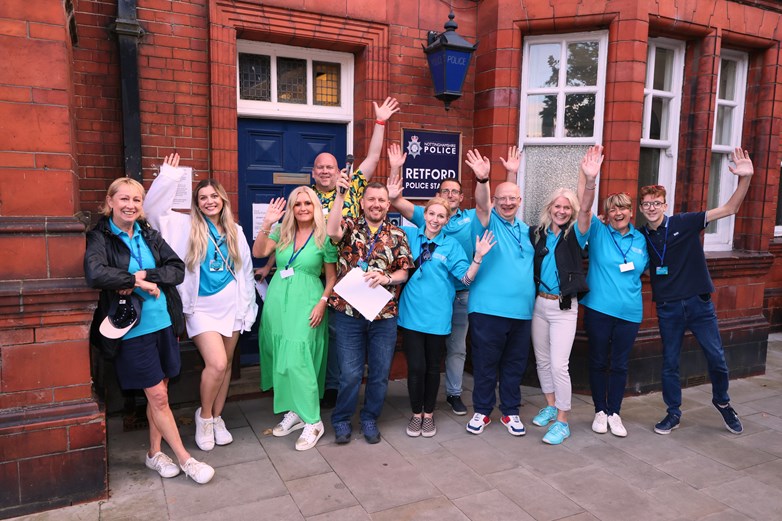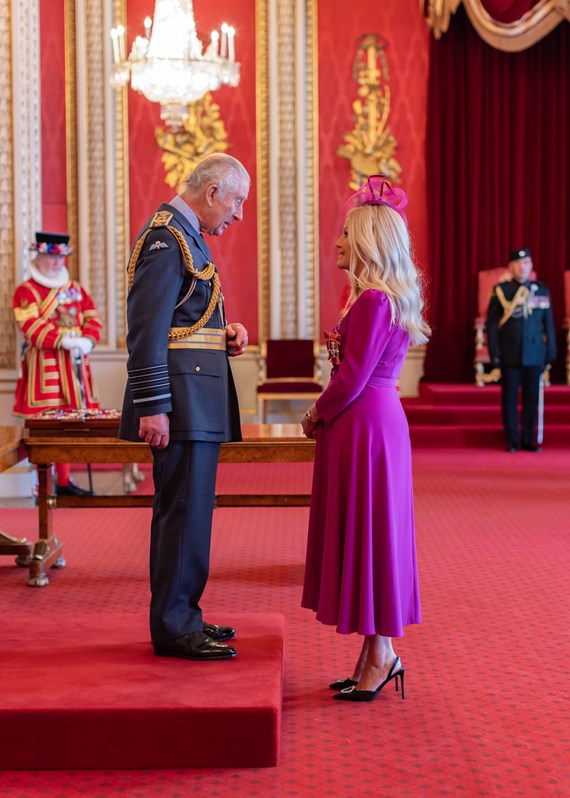Place Leaders in Focus: Sally Gillborn MBE, North Notts BID

In the first of a new series – Place Leaders in Focus – we talk to Sally Gillborn MBE, Chief Executive at North Notts BID about the organisation and its work, her role, the challenges and opportunities, and how she sees place leadership and management.
__
The organisation: North Notts BID
North Notts BID is the UK’s first ever area-wide business improvement district covering the whole district of Bassetlaw. We are the second largest BID in the UK, supporting over 1,100 businesses with almost 1,400 hereditaments spread over 246sq miles.
Our BID members come from all sizes and sectors in rural, industrial and town centre locations. We support them through a diverse range of projects, services, initiatives, workshops and events. Examples of our projects include a digital radio scheme, DISC crime reporting app, SmartWater asset marking, Night Angels, Truckpol and the soon-to-be launched WalkSafe app – all supporting in the fight against business crime, and making our places safer to visit, work and live. We also offer a free maintenance support service for small external jobs (painting, weeding, jet washing, gutter cleaning) a series of workshops (First Aid, Mental Wellbeing) and our flagship events (FoodFest, Party in the Square), to name but a few
The role: Chief Executive
As Chief Executive of North Notts BID I have overarching responsibility for the leadership and strategic direction of the BID company. I also oversee the strategic board and direct all operational aspects, including staff management, budgets, financial control.
I act as a key figurehead and voice for North Notts, ensuring that the BID takes a proactive approach in future-proofing the success of the area.
Ultimately, I ensure that all projects and services are developed and delivered in line with our business plan and meet levy payers’ needs to ensure that they get a good return on investment.
The place: North Nottinghamshire, England
The North Notts BID area has a rich cultural, social and historic significance. It’s a hidden gem of a place, with stories about Robin Hood and the Mayflower Pilgrims, ice-age man, and the industrial revolution. But it is also a great place to business. Our businesses range from multi-nationals through to small independent businesses and historic country estates.
We are extremely excited that West Burton in our district has been selected as the home of the ambitious STEP fusion energy programme, underpinning an industry expected to be worth billions to the UK economy. Fusion promises to be a safe, low carbon and sustainable part of the world’s energy supply with potential to help sustain net zero in the future.
The career
I set up North Notts BID from scratch, from the initial feasibility study, consultation, through to ballot and the first day of our first term on 1st September 2017, so over 6 years now.
I have experience, skills and qualifications gained within a place management, marketing and economic development environment. I have worked in both the private and public sectors, working for, and with the media.
A quick summary of some of my prior career includes managing a business growth grants and loan fund, I was involved in the development, branding and marketing of two business innovation centres, setting up and developing the ‘Invest Newark & Sherwood’ brand for Newark & Sherwood District Council’s Economic Growth Team.
It was in my last role as North Nottinghamshire Place Manager that I developed North Notts BID.
What attracted you to place leadership and management…?
I have spent most of my working life in marketing, economic development and place shaping and I am passionate about improving our area and supporting the businesses within it. In 2014 I saw the North Notts Place Manager advertised on a two-year contract. The job description excited me, but I was concerned about giving up a permanent contract with a local authority. Having lost my sister a few months earlier, I realised that life was short, and the worst-case scenario was that I would look for another job when the contract ended. So, I applied and was interviewed by a panel that included John Till from Thinking Place, and I was lucky to be offered the job.
Little did I know the journey I would embark on, and how I would end up leading one of the largest BIDs in the UK.
Has it changed since you started, and if so how…?
I think as place leaders, we must be agile and adaptable to change. The landscape is ever-changing, notwithstanding the pandemic followed by a cost-of-living crisis. As a result, our town centres need to become more experiential, and it is inevitable that the larger retailers are leaving and that there will be more housing on our high streets. Peoples’ habits have changed, and the hospitality industry, in particular, is still reeling. A lot has changed, and there are undoubtedly still more changes ahead.
What’s the most challenging part of your role…?
The most challenging part of any place managers role is the bureaucracy and red tape that we must navigate around when trying to get certain projects off the ground. We only have a very small team, so it can be very time consuming.
Other than that, as a BID covering 246 square miles and having almost 1,400 levy payers to ensure get a good return on their investment can be a challenge, but one that we embrace.
Probably just as hard to say, what do you find is the most enjoyable element…?
The most enjoyable part of my role is the satisfaction we get when we can see the benefits that our projects, services and events bring. Whether that be seeing the community having the time of their lives at ‘Party in the Square’ and the shops benefiting from the additional trade the events and increased footfall brings in. It can be seeing a shop front painted, or a beer garden jet washed making our high streets more attractive. It can be through our business crime reduction work where people feel safe to spend a night in town because of our Night Angels or an industrial estate that has less crime because of the CCTV with ANPR that we installed.
You’ve a team working with you, tell us more about that and the importance to you of team and partnership working…?

I have a small, but very perfectly formed team working with me. Each role is equally important and crucial to the success of the BID, whether it be managing the day-to-day operations, the social media and marketing, business liaison through to maintenance support. The Strategic Board is also vital in supporting and advising on the direction we take and that the business plan is delivered effectively.
With such a small team, and being such a large BID, partnership working is key. We have an excellent relationship with our local Councils, Police, business forums and other partners. We run the North Notts Business Crime Reduction Partnership and Night-Time Economy Partnership, and I am also on the North Notts Employment & Skills Board, and we partner with Bassetlaw District Council in running the What Next in North Notts careers event. On a personal level, I am also on the board of Governors for the RNN Group, which covers three colleges, a university centre and a post-16 centre.
What would you list as the three biggest issues facing place management right now…?
In my humble opinion these are my current top three:
- Funding – The Council’s ever-shrinking budgets mean that there is less spent on regenerating the area and supporting local businesses. Even with Levelling Up and SPF funding secured, and the opportunity to bid for more funding through Town Boards, it is so time consuming and a constant battle to determine how the money should be spent. Of course, it is important that we have our say in all of this, but we also need to keep the wheels turning by delivering effective projects, initiatives and events with the limited funds that we have.
- Public perception – social media has given people a platform to voice their opinions about their local area. Sadly, there can be a lot of negativities which impact on public perception of their towns. This cascades out and can be quite damaging. It is certainly a challenge for us as BID/Place managers to redress this balance, but we need keep up the good work and continue to bang the drum about the good things that we do and how great our places are.
- Empty shops – high business rates, expensive rent prices and pension pot properties all contribute to a high vacancy rate in many town centres. The High Street Rental Auctions coming into force may ease this somewhat, but there is still a way to go so time will tell. We need to be imaginative in reinventing our high streets to fill these empty shops, bring our high streets back to life and give a boost to the local economy.
If you could ask for one change in a law or regulation that affect place, what would it be…?
As always, business rates reform must be at the top of the list. I am also keen to see the national BID regulations updated and I know that the BID Foundation, ATCM and British BIDs have been pushing for that to happen, so fingers crossed.
Your BID being ‘area-based’ is a little different to those that focus on a single place. How do you see the advantages of covering a wider area…?
I think the main advantage of covering a whole district is the diversity of our levy payers and collaboration and partnerships that can bring. For example, one of our larger food manufacturers, Premier Foods produces the world’s supply of OXO cubes from their Worksop site, and we even have a couple of EDF Energy-run power stations as levy payers. Through the diversity, size and sectors of our levy payers we really do get a holistic view of our place, and not just from a town centres perspective. It also enables us to leverage in additional funds that go into the pot to support the whole district.
On a personal level, what did you think when you opened the letter advising that you’d been awarded the MBE…?

We were in the middle of an office move with no IT when I picked up an email on my phone. I could only see part of the email address so immediately dismissed it as a scam and carried on with the office move. It was only later that evening when I was on my laptop at home that I realised that it was genuine. My initial reaction was shock, disbelief and ‘why me?’. I had no knowledge of the honours system or how it works, it was never on my radar. However, I feel truly humbled, honoured and very lucky being recognised for doing a job that I love.
Has it changed anything about your role or approach to it…?
There is no change in my role or how I approach it because of my receiving the MBE. It’s absolutely business as usual, and I wouldn’t have it any other way.
Finally, if someone reading this was thinking of taking up a role in place leadership and management, what would you say to them…?
If you love a job that has variety, and where no two days are ever the same, then I would highly recommend. Of course, it can be stressful at times, and there are dull moments like in any job, but there is no better satisfaction in seeing the results of your hard work when a project comes to fruition, or an event is a huge success. Place leadership and management is hugely rewarding, I certainly have no regrets.
